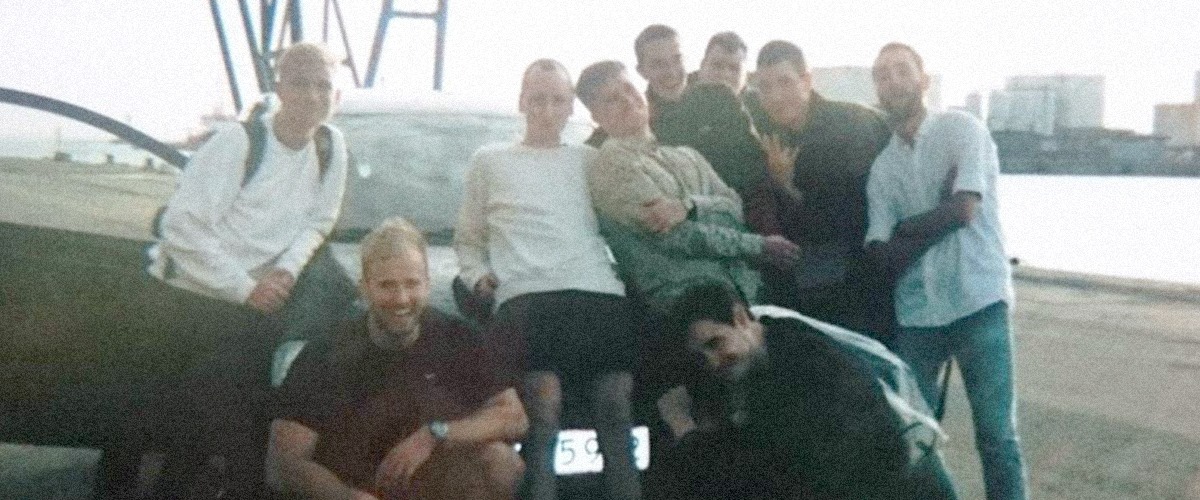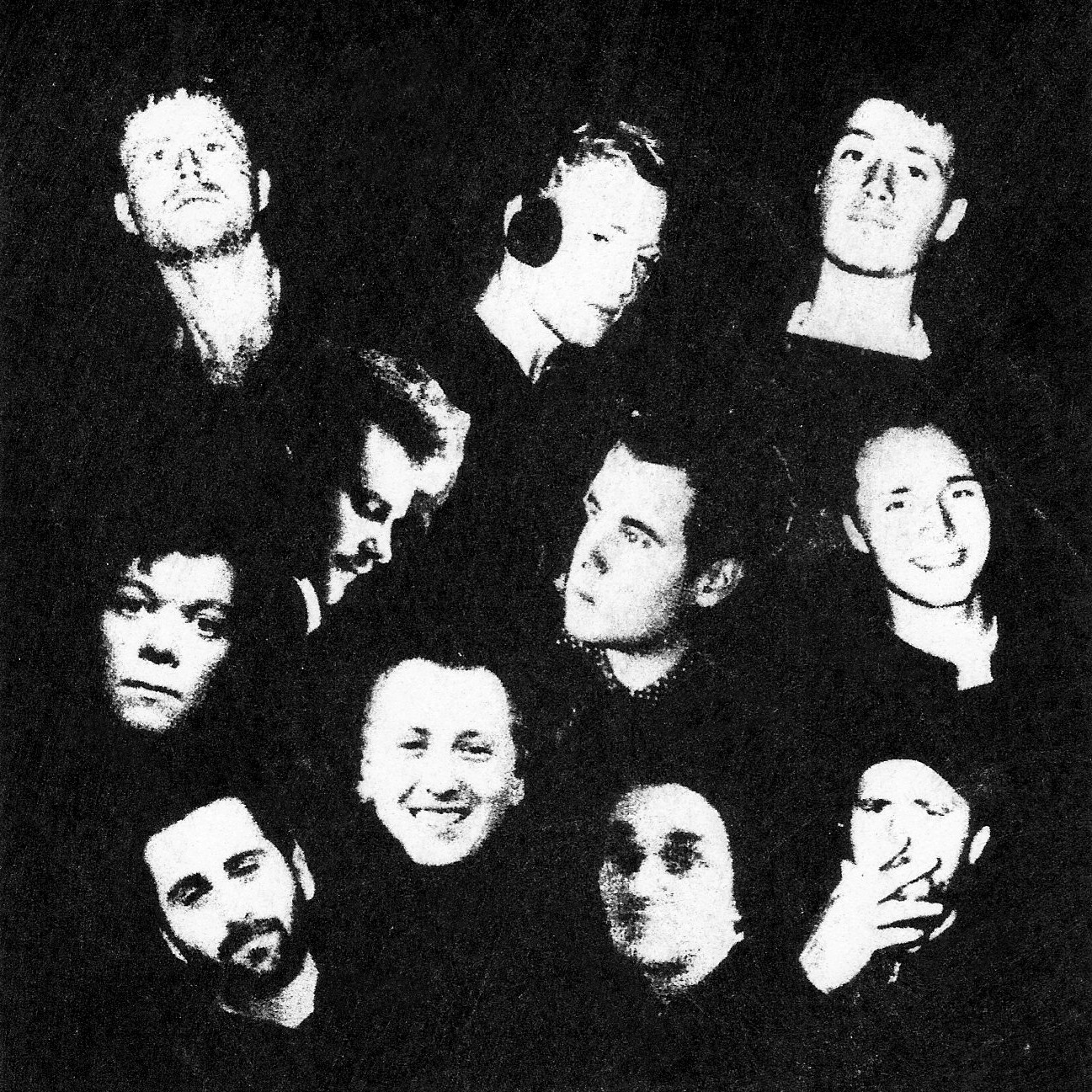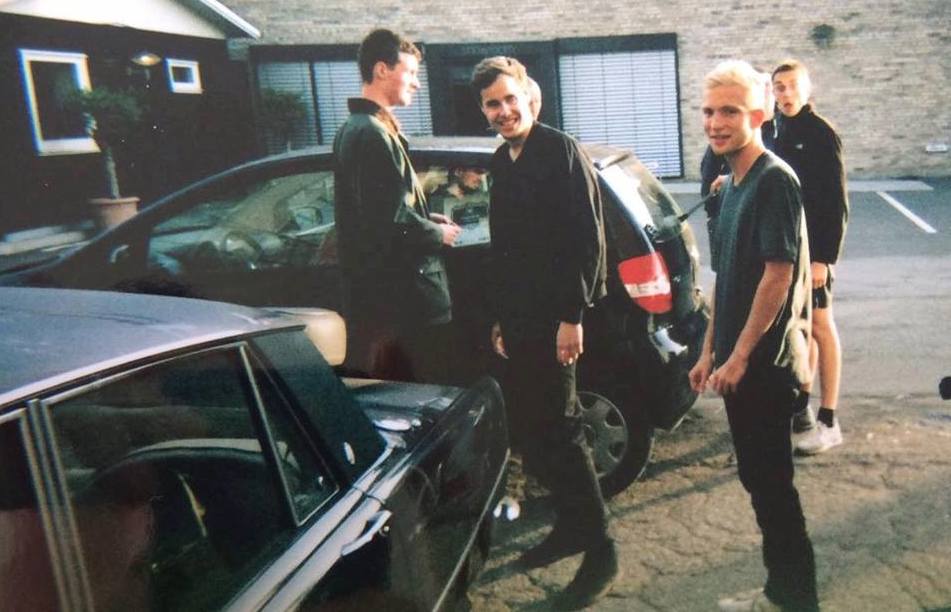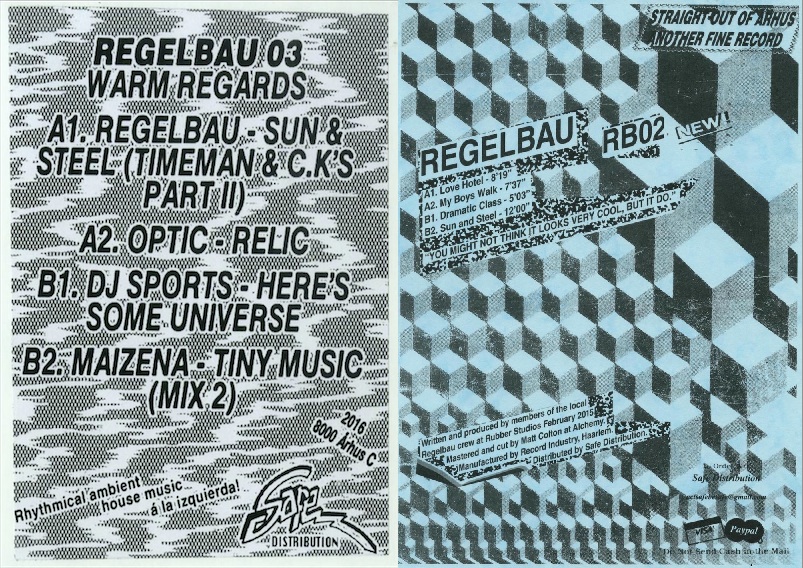Labels We Love: Regelbau
XLR8R chats with the production team behind the Danish label, to try to peel back the layers of the Århus scene.

Labels We Love: Regelbau
XLR8R chats with the production team behind the Danish label, to try to peel back the layers of the Århus scene.

The Danish city of Århus is fostering a small but powerful house movement, an important part of which is Regelbau—a colorful label with heaps of character (and characters working behind the scenes). Philip Kearney chatted with the four key players from the imprint. Two of them (C.K. & Manmade Deejay) have put together a two hour mix available for download via the WeTransfer button at the bottom of the page.
Tucked away on the East coast of Denmark’s Jutland peninsula is its second city, Århus, popularly known as “the City of Smiles.” While the not too far away capital Copenhagen boasts a municipal population of well over half a million citizens and a booming tourist industry, Århus is its much smaller, more humble brother. Upon speaking to four of its residents, it seems they’ve really got a marked appreciation for the place. “People who leave always tend to come back. When they experience something bigger, they always seem to remember that Århus is one hell of a city.”
Christoffer Kejlstrup (a.k.a. C.K., one half of 2 Bit Crew) can only sing the highest praises of his home city. We catch up one June afternoon, along with a few of his friends and collaborators: Mathias Okholm (a.k.a. Manmade Deejay) and brothers Milán (a.k.a. DJ Sports) and Natal Zaks (a.k.a. Central). Together, they are the core members of the 11 strong quasi-label-collective Regelbau, all of whom vehemently back up Kejlstrup’s sentiments as long-term residents and keen endorsers of Århus.
Since dropping their first official release under the Regelbau banner last year, they have all been partly responsible for affirming that Danish city’s place on the house music map. It’s a complicated story that begins at different points for each member; a tale that is made no easier to understand by the web of anonymous pseudonyms that they work under. As a unit they are recognisable for their lush sound aesthetic, one that bounces between house and ambient styles, unified by a general feeling of exuberance and wholehearted fun.
As curious as the project appears today, it was born out of fairly prosaic origins: “We met through this Facebook group that we had before Regelbau, for people who had an interest in record digging. If we were buying records, we could all split the shipping cost,” explains Milán. Naturally the two brothers already harboured a close relationship, as well as already being good friends with Kejlstrup. Through the Facebook group, a bunch of new faces, all in their twenties, came into the mix. A handful of others have involved themselves in studio work: Martin Optic (a.k.a. Optic, the other half of 2 Bit Crew), Asger Bruun Hansen (a.k.a. Forte), Nicolas Hansen (a.k.a. Varieté) and Nils Kristian (a.k.a. K. Dallas). Naturally, in a group of that size, interests and skills lie in different areas—the final trio of Bastian Laigaard (a.k.a. Bastian DJ), Christoffer Roussakis (who performs under his surname) and Kasper Skov mainly channel their energies into DJing.
From that loose social media connection, things picked up for the 11 when they united to throw parties across their hometown. Natal reflects on their former endeavor: “We used to spend a lot of time together throwing those parties, which we don’t really do anymore. That was what brought the 11 of us together.” Through 2014 and 2015, they set a new standard for underground electronic events in Århus, plugging a gap that had left locals devoid of clubbing options, with guests that included the likes of PLO Man spinning alongside their own residents. He elaborates, contending that “the scene here in Århus doesn’t really exist. People don’t really go to clubs to dance or anything like that. We were lucky to throw those parties at a time when the guys and girls who live here wanted to. They were really successful and we had great momentum.”
Back then, their activities were focussed around one central meeting point—a former WWII bunker in the heart of the city, which they collectively rented from the state to house their musical equipment and burgeoning record collections. They cite it as a space responsible for bringing them all together, a comfortable and easy hangout spot. Consequently, as a sort of tribute, it would also provide the inspiration for the label’s name: Regelbau is the official term used for the specific type of underground container that they were occupying.
It was only a temporary arrangement, however, and last year they moved into a more permanent residency in the workshops of their local School for Mechanics. As a central location, it provided a fitting home for those early parties. Starting off with very respectable crowds of around 300 at each event, they hit their apex at one fateful New Years party: “We were expecting a lot of people to show up, but it ended up about double. It was the peak, and it was also what kicked off the label. We made a lot of money from it, but we couldn’t split those profits. So, we decided to use the money to put records out,” recalls Natal.

RB01 emerged in the summer of 2015: three vibrant, sunny house cuts with minimal information around them—the only clue being that they had originated from Århus. At that point, just as the events had been a group effort, the music was too. Natal reveals that “it started off as a conceptual label, which is why the first two releases are credited to Regelbau rather than our individual names. We wanted to make the music together, because we had earned the money together.” The communal spirit that had driven them together in the first place found a home in their music too (with a similarly organised RB02 hitting stores a few months later).
The idealistic vision of 11 friends working together in unison on music production would swiftly become a slightly testing state of affairs. As the old saying goes, too many cooks really can spoil the broth. Amongst the four of them, they chat back and forth about the troubles that it presented: while Natal reflects on the impediments to the creative process, brother Milán ponders the fact that in such a large group, you could “detach yourself from it all. You weren’t responsible in the same way.” The overwhelming feeling that they seem to share, is that it just wasn’t natural. So, after two releases, Regelbau underwent a reshaping.
“It had originally been a collective, a team effort. Now it’s a label. It might be exciting to look at it the other way, but that isn’t the reality for us anymore.”
“We had a meeting with all the guys and tried to discuss how we would carry on in the future. We spoke about splitting the Regelbau crew up. Some would do the parties, and some would do the label. It meant that we could really improve the label process,” clarifies Kejlstrup. As a result, the four in focus would take control of operations amongst themselves, leaving the other seven room to work on other projects. “Before, everyone had an opinion. It was too bureaucratic in a way,” asserts Natal. “It had originally been a collective, a team effort. Now it’s a label. It might be exciting to look at it the other way, but that isn’t the reality for us anymore.”
Refreshing the process transformed their produce, and the more recent Warm Regards and Nat I Århus EPs offer a different experience. Each track comes complete with individual artist names (though working out the producers behind the aliases is another matter). The musical content has remained much the same, mixing spaced-out house and breaks with ambient slow-builders; however, it definitely sounds like they have made progress since those earlier records. The whole thing smacks of a real committedness to getting the best out of the venture.
Looking at Regelbau and its band of Danes as a solitary institution doesn’t quite paint the full picture though. The label is one face of an ever-expanding union of related fronts. Take Kejlstrup for example: long before his involvement in Regelbau, he was pushing his own work through 2 Bit Crew Recordings (alongside partner Martin Optic). “It’s just a label where we can release our own productions, and have an imprint without worrying about anyone else,” he remarks.
Then there’s the independent business of the Zaks brothers: Help Recordings. To the average eye, scanning its discography, the distinction from Regelbau may seem negligible; yet, to those involved, the dividing line is a very clear one. “When I hear something, I never doubt whether it belongs on Help or not. It just makes sense. It’s not necessarily a sound, it’s more just a continuation of what Milán and I believe to be interesting music.”
On top of those two outlets, a new one is soon to be added into the mix, entitled No Hands. The debut EP will feature one track from each of the current Regelbau quartet, and is expected to be released later this year. Kejlstrup outlines its place in the group: “I used to have a label with my friend Anders called Nord Records. After a long period of being active, and about 10 releases, we decided to shut it down. Recently we asked the guys here to start up another one. We wanted to do Nord but with another name, and another profile.” With No Hands on the way, you’d be a fool to bet against more imprints popping up in the not too distant future.

“Not to sound arrogant, but I don’t really care if people follow or not. If people are interested, then they will keep track, or at least have a good time trying to do it. In the end, it doesn’t really matter, as long as people like the music.”
It’s an interesting phenomenon—as a group, they’ve amassed a whole number of labels in a relatively short period of time, though across the board it’s more or less the same handful of artists working to fill each of them with their music. It’s a bold way to go about business, and definitely not a traditional approach. “That’s the curious part of being a record digger or music enthusiast—trying to dig, trying to understand. If everything is presented in a clear way, then it’s a bit less exciting. It’s more fun to bend the rules, and people will get a nice surprise hopefully. I also like the idea that people go after sound rather than the name,” Natal explains. “Not to sound arrogant, but I don’t really care if people follow or not. If people are interested, then they will keep track, or at least have a good time trying to do it. In the end, it doesn’t really matter, as long as people like the music.”
But amongst all of this, how do they envision Regelbau’s unique purpose? The web of aliases and outlets isn’t just an exercise in inquisitiveness. Each imprint seems to be forging it’s own particular identity bit by bit, so what place does Regelbau hold? Natal bats the question off, as though it were a given: “Regelbau is kind of a playground in a way. We don’t plan, we just do. I hope that’s audible in the releases. It’s all just representative of what we like right now.” Rather than concerning themselves with building a concrete facade to satisfy general expectations, they gamble on listeners enjoying their spontaneity. It’s an impulsive creation for impulsive releases, and the music that finds its way there is all guided by instinct.
The picture of the young Danes and their prolific musical output, a confusing mesh on first look, gradually begins to fall into place, everything stemming from the compact yet fruitful Århus community. The smalltown setting has provided a fertile environment for their entrepreneurial outlook. In fact, the lion’s share of all their work is managed in-house. Natal handles all the label’s artwork (which, in keeping with their spirit, tends to allude to gags they are running with at the time of release). He’s also part of Safe Distribution with Kejlstrup, which independently deals with the practical side of their business.
With the support of one another, they’ve come a long way. What’s more unusual is the other types of support they’ve garnered on that local level. “There are quite a few different scenes here within the bigger music one. People are very open-minded about their interests. We are friends with a lot of guys from the rock, punk and new-wave scenes,” Natal remarks. “There are some initiatives to shorten the distance between these separate environments, too. For example, take Golem Distribution, a shop that focuses on underground Danish music. We have about ten representatives from different labels around Århus. I represent Regelbau, Help, and a few others, and there are guys I work with who represent the black metal scene or the punk one.”
The more they give to the City of Smiles, the more it gives back. And it seems like they aren’t nearly done giving. As we wrap up our conversation, the most striking element of it all has been their collective appetite for the music. For a young bunch, they’ve achieved a lot already, and put the foundations in place to do plenty more. Rather than just recycle, they take satisfaction in reinvention, and the list of labels and aliases is only set to keep growing. As for the Regelbau operation specifically though, the fun is just beginning; let’s see where their latest impulses lead.

For an insight into the kind of styles Regelbau are digging at the moment, C.K. and Manmade Deejay put together an exclusive two hour mix for us, available to download below.

